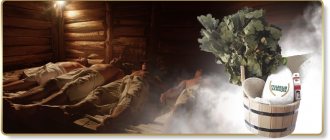For many of us, visiting a bathhouse is an opportunity to relax well, relax in the company of friends, have a great time and, ultimately, improve your health. But at the same time, some people think not only about their own relaxation and enjoyment, but also about how the church views the issue of visiting the bathhouse. This applies, first of all, to deeply religious people; to some extent, the church’s attitude towards visiting the bathhouse is also important for those who do not want to violate the canons and commit sins, despite the fact that they do not consider themselves too deeply a religious person.
The attitude of the church towards visiting the bathhouse
Since ancient times, the bathhouse was a place for receiving hygienic procedures - akin to a modern shower, so the possibility of visiting it is not rejected by the church as such, because a person must take care of himself and be neat, but the bathhouse has always been the only village building that was not illuminated.
This fact alone indicates a special attitude towards the bathhouse, which was not as favorable as it might seem. However, people always visited the baths to wash themselves, but only on the eve of church holidays. Usually these days were called bath days, they fell on the day followed by a holiday, or a few days before major religious events.
For example, Maundy Thursday is widely known, when ablution is carried out even before sunrise - two days before one of the biggest Christian holidays in honor of the resurrection of Christ - Easter.
St. Nicholas Day - the history of the holiday, what you can and cannot do
On December 19, Christians celebrate a great holiday - St. Nicholas Day. In Rus', which since ancient times has revered this saint as one of the most beloved among the people, he had several names: Nicholas the Wonderworker, Nicholas the Pleasant, St. Nicholas, Nicholas of Myra. Thus, people in their nicknames wanted to reflect his services to the Savior and the wonderful, varied help that he provided to believers during his life and after death. The most interesting and memorable moment of this holiday, especially for children, is the arrival at night of a fairy-tale character who puts gifts for the kids near the bed, in shoes or in special decorated socks prepared in advance.
Where did this tradition come from?
In fact, there was such a story in the life of the saint: a poor family lived in a neighboring house with him, the woman died early, and the man remained a widower, but he had a beautiful young daughter who loved a guy from a rich family. The young man's wealthy parents did not accept a poor girl without a dowry. Nikolai decided to help the beauty, because he had an inheritance from his parents. Then he changed his clothes so that no one could recognize him, approached a poor house at night and threw a bag of gold money into the window of the girl’s room. Thanks to this, the couple was able to unite their hearts in marriage, and the miracle that helped to do this became famous throughout the city. After this, people began to say that some heavenly angel helped the lovers. Then the Wonderworker began to walk around the city and help all the poor and disadvantaged, bringing warm clothes, food and toys to their homes. He always did this at night, but the residents still tracked him down and were very surprised that the modest guy was selflessly doing good. Many centuries have passed since the time when Saint Nicholas lived on earth and did his good deeds. Love for him gives rise to a desire in people to learn more about him, and not only as a miracle worker, but also as a simple person. After his death, people received more information than during his lifetime, since Nikolai lived in his own inner world and did not like to talk about the good deeds he had done.
Life of a Saint This saint was a real historical figure. It is believed that he was born in 270 AD. e. and lived until 345. The parents of Nicholas the Wonderworker were very pious and wealthy people: Theophanes and Nona. He was the only child in the family. His parents prayed constantly, since for a long time they had no children at all. When a baby appeared in their family, they promised God that Nicholas’s life would be devoted to worship, faith and religion. Everything did not happen as planned, because the boy was left an orphan. The life of Nicholas the Wonderworker at that time was marked by the fact that he began to live away from people, like a hermit. The man was fully occupied with scientific activities. Nicholas the Wonderworker was among the participating bishops in the first Ecumenical Christian Council in 325.
Relics of Saint Nicholas
Nicholas died when he was 75 years old. After the death of Nicholas the Wonderworker in 345, his relics became incorruptible and began to emit the fragrance of a healing substance. His myrrh healed many believers from a wide variety of ailments. The relics of Nicholas were in one of the churches of his hometown of Mir. In the eleventh century, there were military raids on Byzantium: they tried to plunder and desecrate the relics of the saint. Then Christian believers decided to save them and moved them to the city of Bari (Italy), where they are still located. Nowadays, anyone can pray near them and ask for the healing of illnesses. As recently as 2009, based on X-rays and cranioscopy, scientists were able to describe the saint’s facial features. It was determined that he was a man of short stature (about 1 meter 68 centimeters) with a high forehead, prominent cheekbones and chin, he had brown eyes and dark skin.
The worship of the Russian people to the saint They began to worship him after the Baptism of Russia. The first icons and prayer to St. Nicholas the Wonderworker appeared only at the end of the eleventh century. Despite this, in Rus' there were a large number of churches and temples dedicated to him. In Kyiv, Saint Olga erected the Church of St. Nicholas over the grave of Askold, which was the first in the entire Russian land. Today, one of the Kremlin towers bears the name Nikolskaya.
When is the Day of St. Nicholas the Wonderworker celebrated?
The Day of St. Nicholas the Wonderworker is celebrated not only in December, but also in May - this is the day when his relics were transported to the Italian city of Bari.
These two months (May and December) were chosen for a reason. There is such a legend: One day a simple man was driving along a country road, and his cart got stuck in the mud. The cart was very heavy: the peasant could not pull it out alone. Just at this time the saints were coming to God. One of them, Kasyan, passed by a man with a cart. Then the peasant begged for help. Kasyan was offended that he was bothered over such a trifle. In clean, beautiful clothes, he walked past the peasant. Then St. appeared near the cart. Nicholas the Wonderworker. The man also asked him for help. The saint helped the peasant without hesitation. Together they pulled the cart out of the mud. But Nikolai got all dirty. All the saints gathered with God. He began to ask them: why was Nikolai so late, because of which all his clothes were smeared in mud? Then Nicholas the Wonderworker told what story happened to him along the way. God then asked Kasyan why he didn’t help the man and walked past him? He replied that he could not be late for the meeting with God and come in dirty clothes. The Almighty then said that people would celebrate the feast of St. Kasyan only once every 4 years - on February 29. At the same time, St. Nicholas Day will be celebrated twice a year - in May and December. After all, he helps ordinary people without hesitation, let them honor and glorify him.
How does St. Nicholas the Wonderworker help? During his life, Nicholas the Wonderworker performed many holy deeds and miracles: - when the local mayor slandered three military leaders, Nicholas saved them from death, preventing the executioner from carrying out the death sentence for the falsely accused. - prevented severe famine for the inhabitants of his native city called Mira; - he saved people from misfortune and hunger more than once on water and land. There is a story that one day Nicholas was able to resurrect a simple navigator who fell from his ship during one of his voyages during a storm and fell to his death. After this, the Saint began to be considered the patron saint of people working at sea! People believe that St. Nicholas the Wonderworker helps not only sailors, but also military men and merchants, and is a protector and benefactor of the poor common people and children. As popular wisdom says: “Nicholas will save you at sea, Nikolay will help a peasant lift a cart.” Saint Nicholas helps people: Get rid of evil thoughts and bad intentions. Find and create a harmonious relationship with your other half. Strengthen marriage bonds, preserve the happiness and love of married life. Helps those who were innocently convicted and convicted. Supports people in hopeless situations.
In what cases can you turn to St. Nicholas the Wonderworker? The saint will support if an ordinary person has difficult situations in life and material problems. Girls who are not yet married ask him for a successful future marriage. Women who are already united pray for mutual understanding and love with their husbands. People whose profession is connected with a dangerous road (drivers, sailors, travelers, etc.) turn to the saint so that good luck will accompany them and the danger will pass.
The main traditions of the holiday
Children are the ones who look forward to this holiday the most, since it is traditional to put gifts under their pillows.
At the same time, in Europe this tradition is implemented differently - they hang special socks in which Nikolai puts his gifts. On St. Nicholas Day it was customary to organize festive gatherings. The young people gathered at a gala dinner and discussed plans for the next year. 9:18908 9:4
In some Slavic regions, people always kept track of who would enter their house first. It was believed that if a person with “positive energy” came, the next year would be prosperous. Such people were called “useful people.” On this day, the girls began preparing for Christmastide: they sewed leisure outfits and prepared materials for fortune-telling. One of the symbols of St. Nicholas Day is the small “Nikolaichik”. This is a chocolate candy in the shape of a person. It is traditional to give such products to children.
St. Nicholas Day: what to do
On St. Nicholas Day, you definitely need to go to church for a festive prayer service. On December 19, it is best to start with the morning service. Also on Nicholas, you need to read a prayer to the Saint and ask for health and prosperity for yourself and your loved ones. It is believed that December 19 is the last day when you can pay off all debts. Following the example of St. Nicholas the Wonderworker, on this day it is necessary to help loved ones, give alms, but not advertise it. Nicholas the Wonderworker is the patron saint of children. Therefore, on this day it is customary to help children, for example, it is worth donating blood, going to orphanages or buying medicine for sick children. According to folk tradition, on St. Nicholas Day gifts are placed under the pillow, most often sweets: sweets, chocolate, gingerbread. Gifts should be placed at night so that in the morning a person wakes up and finds a present from Nikolai under the pillow. Our ancestors always had fun on St. Nicholas Day, held festivities, set a sumptuous table, and invited guests. This is a fun holiday, so December 19 should be spent in joy and fun.
Nicholas Day: what not to do
On St. Nicholas Day, it is forbidden to swear and use foul language. It is believed that all negative energy is returned threefold.
St. Nicholas Day is a very big holiday in the religious calendar, so you should not violate long-standing church prohibitions. According to church canons, this day should be dedicated to serving God.
Another prohibition concerns hard work. You should refrain from repair work, washing, cleaning, sewing and the like. On St. Nicholas Day you cannot lend. Our ancestors believed that the borrower, along with the money, could take good luck and luck out of the house.
The Nativity Fast continues on December 19, so you should stick to your diet. The list of foods that should not be consumed includes: meat, eggs, butter, dairy products. It is prohibited to drink alcohol on this day. The Church canonized Nicholas, and nowadays in many homes they pray to this saint in grief and joy, and children receive gifts every year on St. Nicholas Day. But the main thing is that they learn kindness and love for people, so that they can later pass on this unshakable tradition to their children. And as long as tradition and history are alive, the people are alive and the family is alive.
12:6538
Going to the bathhouse on holiday
Visiting a bathhouse directly on a church holiday has always been considered a sin, but today most people simply cannot follow such church canons, since the vast majority of religious holidays fall on weekends, when a working person wants to relax and meet with friends.
Deeply religious people, of course, often refuse to visit the bathhouse as such. This is due to the fact that in modern realities of a combination of religious and social components, there is simply no time to go to the steam room, unless the bathhouse is built in your yard.
When not to go to the bathhouse
If you do not consider yourself a deeply religious person, then you should take the instructions of the church more simply and you can go to the bathhouse when you have the opportunity and desire. You should not go here except on major holidays: Christmas, Easter, Trinity, the Annunciation. However, on such major holidays, most people still go to church, so the question of visiting the bathhouse does not arise as such.
People who follow the religious calendar can go to the bathhouse on certain dates without committing sins, but in this case, going to the steam room should be considered not so much a rest and an opportunity to fully relax, but an opportunity to take hygiene procedures and act in accordance with the traditions that were still from our grandfathers.
Signs for Nikola
According to popular beliefs, if a girl was matched on May 22, she would become a faithful and hardworking wife. Other signs for Nikola Letny:
- rain - to a rich harvest;
- if frogs croak, there will be a lot of oats this year;
- good weather indicates warm future days;
- dandelions are closed - it’s getting colder;
- if the birds fly high, then the weather will be good, and if it is low, then you should expect rain.
Our ancestors also paid attention to the Moon. If she was huge and beautiful, then this is a good sign. So, soon you will be happy.
Bathhouse in modern conditions
Modern baths and saunas are very different from those that existed in Rus' before the beginning of modern history, and therefore the attitude that is formed towards them in society turns out to be completely different.
Today, visiting a bathhouse is not only hygienic procedures or an opportunity to have a good rest, but also often medical procedures, an opportunity to get rid of extra pounds or tone up your body.
That is why in modern conditions it is not always advisable to consider the attitude of the church to visiting the bathhouse, since it was formed centuries ago, and today the situation has changed significantly.
Preparation of brooms
Oh, it was a special procedure! Firstly, it was recommended to go into the forest for a broom on a full moon. Allegedly, the trees were imbued with special power at this time. Maybe they are also getting drunk now.
Secondly, if you decided to break branches, you had to ask the tree for forgiveness. Caring for nature is the right approach. Do you agree?











